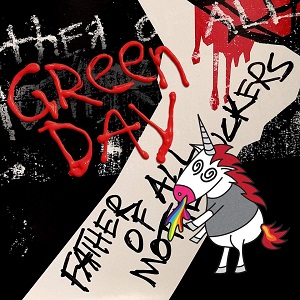Album Review: Green Day—’Father of All Motherfuckers’
Posted: by The Alt Editing Staff

Green Day is a band that holds an important place in many people’s hearts. For many of us born around the turn of the century, the songs from 1994’s pop-punk classic Dookie are timeless. Songs like “Basket Case” and “When I Come Around” are still on the radio today, and 2004’s American Idiot reinvigorated the band artistically and commercially for a whole new generation of young fans. They once again found success (to a slightly lesser degree) with 2009’s 21st Century Breakdown, but things started to fall off during “the trilogy.”
In 2012, Green Day announced not one, but three albums to be released two months apart; titled Uno (with a power-pop-punk theme), Dos (with a garage rock theme), and Tre (with a ballady, alternative rock theme). Anticipation was high, but the on the day of Uno’s release, frontman Billie Joe Armstrong had a now-infamous outburst at the iHeartRadio Music Festival, and the day after he revealed he was heading into rehab for painkiller addiction. All upcoming promotional appearances and tour dates were either cancelled or postponed. The lack of promotion caused the albums to progressively suffer commercially (Dos and Tre only had one single each, and Tre, having been moved from Jan. 2013 to Dec. 2012, is the lowest charting Green Day album on the Billboard 200 to date at #13). But aside from commercial performance, the albums were lackluster and bloated. Armstrong later stated that, in retrospect, the band was being “prolific for the sake of being prolific.”
Despite all of this, Green Day’s star barely waned. They were inducted in the Rock and Roll Hall of Fame’s 2015 Class, their first year of eligibility. In 2016, they announced Revolution Radio, an album produced solely by them and recorded at OTIS, their own studio. It was stripped back and showcased their punk roots. Lead single “Bang Bang” was promising, along with tracks like “Revolution Radio” and “Too Dumb to Die.” But the majority of the album felt mailed in, with too many asinine lyrics and a nondescript musical identity. For the first time, it seemed that Green Day were truly dropping the ball.
Which brings us to their latest album, Father of All Motherfuckers, and the single of which greeted fans with some sort of abysmal horror. Billie Joe’s distorted falsetto, the return of the garage rock influence, the line “come on honey, count your money”, the album art—consisting of the art from American Idiot cropped, defaced, and emblazoned with a cartoon of a unicorn vomiting a rainbow—and that stupid-ass title. Not to mention the press release that included an elitist, chauvinist statement that “rock has lost its balls…” and their work with producer Butch Walker (known for his clean pop-rock style). Fans felt as if they were in a sort of apocalypse, that the band they loved for so long was dead.
Following a snippet of an interview where Armstrong stated that the album was to be their last for longtime label Reprise, some fans spouted a theory that the album was intentionally low effort (including its 10 song, 26-minute run-time) merely to free themselves from their contract and be free to create the album they “truly wanted”— allegedly titled “Magnum Opus of the Inglorious Kind,” which now appears to be an elaborate prank pulled by a band of Green Day fans named Panicland. Three more singles followed, none of which quelled fans’ fears, and on 2/7 the whole thing dropped.
Dos was, in fact, not Green Day’s first foray into garagey rock ‘n’ roll revivalism, but their second. Their first was in 2008, with a couple other musicians in an outfit called Foxboro Hot Tubs, with an album called Stop, Drop, and Roll. During a promotional interview for the trilogy, it was stated that Dos could be considered the second Foxboro Hot Tubs album, and by that logic, Father of All Motherfuckers could be considered the third. Stop, Drop, and Roll and Dos both had their share of fantastic songs (“Mother Mary” and “Lazy Bones” come to mind), so who’s to say that Father of All Motherfuckers won’t?
Upon repeated listens, there are things to like about the title track. Drummer Tre Cool provides a fast-paced beat that’s different from how he typically plays, and bassist Mike Dirnt kicks out a slick bassline during the pre-chourses. But aside from that, the previously mentioned flaws prevent the song from being good as a whole. However, it does a good job of showcasing Walker’s production, which beefs the drums, bass, and guitar to a satisfying level that hits pretty hard. Unfortunately, the vocals are left fighting for its own space, causing some of Armstrong’s lyrics to be lost in the 100% Pure Uncut Rock. To give it credit, as a lead single, it does a good job of setting the sound of the album, for better or for worse.
Interestingly, the four singles weren’t scattered tracks off the album (as what it tends to be), but the first four songs in the tracklist. The second track, “Fire, Ready, Aim” does indeed rock a tad harder than the preceding song, but it’s brought down by an overload of “oooh’s,” “aaah’s,” handclaps (which will occur too many times as the album continues), and absolutely bizarre lyrics such as “Kick the dog when the whistle blows / Well you’re a liar (Aa-aa-aa-AA-AA-AA-AA)” and “Baby got the hyperbole (Oo-OO-oo-OO)”. Armstrong’s shouted lyrics seem to be second to the AAAAAAAAA and OOOOOOOOs to the point that they almost seem like pure filler, something that he never did previously.
“Oh Yeah!” slows down the pace, and has a lyrical high-point in its chorus as Armstrong sings “Everybody is a star / Got my money and I’m feeling kind of low / Everybody got a scar / Ain’t it funny how we’re running out of hope?”, drawing attention to how notoriety and material possessions can’t save people from social and political strife. But some of the other lyrics are too obtuse to properly expand on the idea, and musically, the inclusion of a sample (although an interesting idea) of Joan Jett’s cover of “Do You Wanna Touch Me (Oh Yeah)” just feels like an extraneous nod to rock’s past.
“Meet Me on the Roof” has a tight riff with a terrific chorus that’s reminiscent of the highs of Foxboro Hot Tubs (along with a bridge that breaks up the usual verse/chorus/verse monotony), but it still suffers from lyrics that are little more than several different ways to communicate that you’re intoxicated (And do you really think Armstrong hangs with cholos?). And there’s that damn falsetto. Still, it shows Green Day can still make a catchy tune if they try, and they do it more than once.
“I Was Teenage Teenager,” musically, is also fantastic, but is so lyrically generic (aside from a light Against Me! reference) in its description of what it’s like to be that young, searching for drugs and how “school is for suckers.”
“Stab You in the Heart,” is a song that is both in love with the past and trying to rewrite it, taking cues from Little Richard but also their own song “Fuck Time” from Dos, replanting its chorus riff in this song’s own chorus. It’s a combination that works well sound-wise, but “Fuck Time” was such a stupidly absurd, horny-ass song that to be reminded of it is a grave offense, and the take on mid-20th century rock is one of many damning examples of the album’s bothersome fetish with the past.
“Sugar Youth” is definitely the album’s strongest track, a fast-paced punk tune that not only outdoes the rest of the album, but some of the songs on Revolution Radio, making you wonder why Green Day seems so reluctant to attack with the punk-ferocity that they’re no stranger to.
However, both “Sugar Youth” and the succeeding “Junkies On a High” suffer the sin of being too obvious. Of course “Sugar Youth” would be fast-paced and punky, akin to a sugar-high. Of course “Junkies On a High” will be a slow-paced crawl, with lyrics about “watching the world burn.”
“Take the Money and Crawl” is yet another tune with a cool sound ruined by a piss-poor lyric, as no one wants to hear a father of two to ask them to “take a walk or suck [his] cock”.
The final track, “Graffitia,” complete with honky-tonk piano, is another nice tune, that apparently is about the closure of rust belt factories and racial violence perpetrated by police officers, but gets away with saying next to nothing, with the very small number of lines on the aforementioned subject being the lyrical equivalent of “damn, that sucks.”
And that’s Father of All Motherfuckers. It’s just not good. It has very few bright spots, it’s full of meaningless lyrics, uninteresting music, obnoxious vocals, and something grating in every song. It’s an album where you constantly search for the lesser of ten evils. To be completely honest, it sounds like a musical midlife crisis. A rose-tinted look on the past, trying to revive it in a surface-level way that looks unnatural from an outside perspective. Green Day were never abstract, and they were never Kerouacs with their lyrics, but they’re great musicians and could write deep songs if they wanted to. Father of All Motherfuckers is such a look backwards, playing on a reductive view of old-time rock n roll that it can be seen almost as a parody, a Spinal Tap-esque pastiche of the genre they claim to pay tribute to. It’s Greta Van Green Day.
Even so, after all this, it’s hard to dislike Green Day. It wasn’t too long ago that they still sounded fresh, and the assumption that artists can no longer make good music after a certain point in their careers is pointedly absurd. They definitely don’t need to play pop-punk until the cows come home, but they need to figure out a way to push their sound forward and experiment in a way that feels fresh and exciting. Unfortunately, this isn’t it.
Disappointing / Average / Good / Great / Phenomenal
—
David A. Gutierrez | @dagewts
The Alternative is ad-free and 100% supported by our readers. If you’d like to help us produce more content and promote more great new music, please consider donating to our Patreon page, which also allows you to receive sweet perks like free albums and The Alternative merch.










